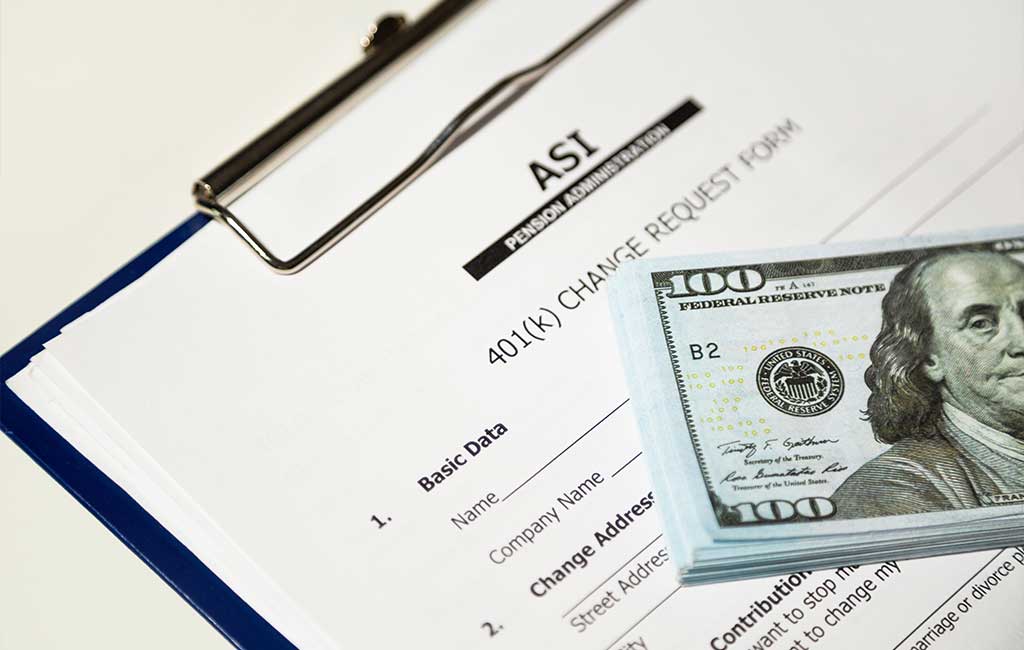According to many financial experts, a Roth IRA is one of the best kinds of retirement accounts. Roth IRAs offer a slew of great benefits, including tax-free income and the benefit of being able to pass tax-free money along to your heirs. Also, due to the Roth IRA’s tax-free benefits, account holders have flexibility regarding retirement income.
So, what do you do when you have some other retirement plan and realize that you’d be better off with a Roth IRA?
Well, the good news is that it is not too late!
Thankfully, it is possible to convert other retirement plans like a traditional IRA or 401(k) to a Roth IRA, allowing you to take advantage of the many benefits that a Roth IRA offers.
By converting to a Roth IRA, you’ll take advantage of lower tax rates and you’ll establish a tax-free income for retirement. Once you’ve invested in a Roth IRA, you can reap the benefit of tax-free income for years, and even decades, to come.
This article will address setting up a Roth IRA conversion and obtaining tax-free Roth IRA income for retirement.
What’s a Roth IRA?
Roth IRAs allow the account holder to save for retirement, offering attractive tax advantages and incentives. Roth IRAs enable you to deposit after-tax income, invest in a wide range of different assets, and withdraw earnings, tax-free, upon retirement (age 59 ½). The most obvious perk of a Roth IRA is the tax-free withdrawal option, but the perks do not end there.
A Roth IRA can prove especially valuable when you conduct your estate planning because a Roth IRA can be passed along to your heirs, who will also receive significant tax benefits. Regardless of age, anyone can invest in Roth IRAs if they possess enough income to cover their investment contribution.
Roth IRAs also offer plenty of flexibility, such as none of the required minimum distributions found with traditional IRAs. Contributions can be taken out any time, without any penalties, while earnings taken out early will be subject to taxes and penalties. However, some situations do qualify for penalty-free withdrawals.
When it comes to Roth IRA conversions, withdrawal rules work differently. For example, a traditional IRA or 401(k) that is converted into a Roth IRA will be both taxed and penalized when withdrawals are made within five years of the Roth IRA conversion or prior to retirement age. The five-year rule doesn’t apply to withdrawals from conversions after retirement. It is also important to note that when making multiple Roth IRA conversions, each one will be subject to the five-year rule individually.
Check out this great video we created about Roth IRAs.
How do you do Roth IRA conversions?
- Step #1: Open a Roth IRA. To convert a traditional retirement account to a Roth IRA, you’ll obviously need to open a Roth IRA account through a financial institution. If your Roth IRA account already exists, you can use that account for the conversion.
- Step #2: Contact your plan administrators. You’ll need to get in touch with your existing financial institution (the plan administrator for your existing traditional retirement account) and your new financial institution (the Roth IRA administrator) and find out what they require to convert to the new Roth IRA account. It should go without saying that this step will be much easier if you choose to open your new Roth IRA account with the same financial institution you have been using for your traditional retirement account.
- Step #3: Submit all of the paperwork. Once you have determined what is necessary for the conversion, provide that information to the financial institution so that your assets can be converted.
Who should do a Roth IRA conversion?
- An individual earns too much money: Roth conversions are a great idea for anyone who makes too much money to open a Roth IRA normally. In this case, you would first contribute to a traditional nondeductible IRA and then convert it to a Roth IRA. That is what’s known as a backdoor approach to opening a Rote IRA.
- An individual expects to pay a higher tax rate later in life: For those currently in a lower tax bracket but expect to be in a higher tax bracket when they plan to withdraw, converting to a Roth IRA is most advantageous. You may be in a different tax bracket later in life if you live in a particular state that collects income tax, earn more money later in life, or pay higher federal income taxes. Take, for example, a Texas resident who retires to California. Converting their IRA to a Roth IRA in preparation for retirement would make the most sense because Texas is a no-tax state, and California is a high tax state that taxes IRA income but not Roth IRA income. In a scenario like this one, you would want to convert in Texas, avoiding taxes on the conversion and then avoiding taxes on your retirement withdrawal when you’re in California.
- An individual has a lower income in a particular year: Sometimes it makes sense to convert to a Roth IRA in a particular year when your income is expected to be unusually lower. Recently, many people have quit their jobs and explored new career opportunities. For those opting to take some months off of work before embarking on their new career, a Roth IRA conversion might be the best move because of a temporarily lower stream of income.
- An individual wants to leave tax-free income to their heirs: If you are interested in leaving a tax-free income to your heirs, a Roth IRA conversion is the way to go. A Roth IRA conversion can be especially beneficial when you leave the money to an individual that is not your spouse and IRA inheritance rules are unique and advantageous.
The SECURE (Setting Every Community Up for Retirement Enhancement) Act, signed into law in December 2019 to improve retirement savings opportunities for workers, states that when you leave a traditional IRA to an individual other than a spouse, they must take all the funds within ten years. Depending on the account size, this rule can result in significant tax consequences for the beneficiary. With a Roth IRA, your heirs can avoid these tax consequences. Although the ten-year rule still applies to Roth IRAs, the beneficiary wouldn’t have to pay taxes on withdrawals.
What types of accounts can you convert to a Roth IRA?
The conversion to a Roth IRA requires transferring your retirement assets into a new or an existing Roth IRA account. Accounts that are eligible for a Roth IRA conversion typically fall into one of two different categories:
Existing accounts like traditional IRAs, SIMPLE IRAs or SEP IRAs can be converted to a Roth IRA to reap its many benefits. As mentioned earlier, the process is typically quite straightforward. Usually, it involves contacting whatever financial institutions hold your accounts and following their directions, which generally consists of filling out and filing some paperwork.

An employer-based retirement plan is eligible for a Roth IRA conversion using what is known as the rollover option. That means that you can convert any 401(k) accounts from a previous employer to a Roth IRA as long as you can cover any necessary taxes and fees. You can convert a Roth 401(k) without creating any tax liability. You will likely have access to additional investment options within an IRA than with your existing employer-based retirement plan.
What should you be looking for when converting to a Roth IRA?
Although it can be easy to set up a Roth IRA, you will want to pay close attention to the rules to maximize your opportunities and avoid paying needless taxes.
When converting to a Roth IRA, consider the following:
You will have a tax bill when converting a traditional IRA or 401(k) that uses pre-tax contributions, like an IRA or a deductible 401(k). When you convert, you recognize those contributions as income and will have to pay taxes. These are the taxes that you did not have to pay when they were first deposited into the account.
You’ll avoid that tax hit when converting a Roth 401(k) to a Roth IRA because both are after-tax accounts. Remember, however, that any employer match deposited into a Roth 401(k) is held in a traditional 401(k). Therefore, the employer-matched portion cannot be converted tax-free.

Most financial experts advise that careful conversion planning is required to minimize any associated tax hits. One of the best ways for individuals to do this is to space out the conversion over the years rather than converting the entire amount to a Roth IRA in a single year. In doing so, an individual might avoid moving into a higher tax bracket and also may avoid paying more on every incremental dollar of money converted.
The more time that lapses between the Roth IRA conversion and withdrawing the money for use, the better, according to experts. That allows the money to grow after the tax bill has been paid.
Speaking of allowing time to pass, the IRS requires that you wait five years from the Roth IRA conversion before accessing the money. Failure to do so will result in taxes and penalties on those withdrawals. Those who believe they may need to withdraw their assets within the five-year window may wish to reconsider the conversion or talk to a Certified Public Accountant to decide if it is the best option.
For anyone participating in a government healthcare program or other types of programs dependent on income, be aware that a Roth IRA conversion may affect your program eligibility and cost. Because a Roth IRA conversion is considered taxable income during the year that it occurs. Therefore, it could affect eligibility under the Affordable Healthcare Act, your financial aid eligibility, or even your child’s financial aid eligibility. That should factor into your decision of how much money to convert or to convert at all.
If you are two years away from receiving or you are already receiving Medicare benefits, expect your Medicare premium to increase two years after a Roth IRA conversion because Medicare uses a two-year look-back in determining premiums, and, as noted earlier, your income will be higher in the year you convert.
Avoid waiting until the end of the year to consider a Roth conversion because the IRS does not offer extensions. The conversion must be completed by December 31 of the year you wish it to count toward.

If all this Roth IRA conversion talk has your head spinning, it might be a good idea to consider hiring a financial advisor who can help you to make the right decision.
Roth IRA Conversions: The Takeaway
A Roth IRA conversion is great for those looking to create a tax-free income during retirement. However, it is important to consider any trade-offs, particularly any immediate tax consequences associated with converting. If you are converting an exceptionally large account to a Roth IRA, consider ways that you can minimize the tax consequences. Again, hiring a financial advisor or tax professional will likely pay off in the long run, especially in these situations.









